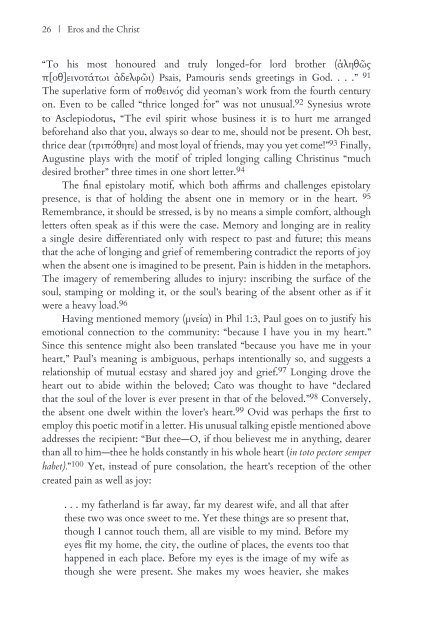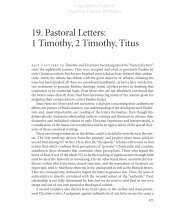Chapter 1 - Augsburg Fortress
Chapter 1 - Augsburg Fortress
Chapter 1 - Augsburg Fortress
You also want an ePaper? Increase the reach of your titles
YUMPU automatically turns print PDFs into web optimized ePapers that Google loves.
26 | Eros and the Christ<br />
“To his most honoured and truly longed-for lord brother (ἀληθῶς<br />
π[οθ]εινοτάτωι ἀδελφῶι) Psais, Pamouris sends greetings in God. . . .” 91<br />
The superlative form of ποθεινός did yeoman’s work from the fourth century<br />
on. Even to be called “thrice longed for” was not unusual. 92 Synesius wrote<br />
to Asclepiodotus, “The evil spirit whose business it is to hurt me arranged<br />
beforehand also that you, always so dear to me, should not be present. Oh best,<br />
thrice dear (τριπόθητε) and most loyal of friends, may you yet come!” 93 Finally,<br />
Augustine plays with the motif of tripled longing calling Christinus “much<br />
desired brother” three times in one short letter. 94<br />
The final epistolary motif, which both affirms and challenges epistolary<br />
presence, is that of holding the absent one in memory or in the heart. 95<br />
Remembrance, it should be stressed, is by no means a simple comfort, although<br />
letters often speak as if this were the case. Memory and longing are in reality<br />
a single desire differentiated only with respect to past and future; this means<br />
that the ache of longing and grief of remembering contradict the reports of joy<br />
when the absent one is imagined to be present. Pain is hidden in the metaphors.<br />
The imagery of remembering alludes to injury: inscribing the surface of the<br />
soul, stamping or molding it, or the soul’s bearing of the absent other as if it<br />
were a heavy load. 96<br />
Having mentioned memory (μνεία) in Phil 1:3, Paul goes on to justify his<br />
emotional connection to the community: “because I have you in my heart.”<br />
Since this sentence might also been translated “because you have me in your<br />
heart,” Paul’s meaning is ambiguous, perhaps intentionally so, and suggests a<br />
relationship of mutual ecstasy and shared joy and grief. 97 Longing drove the<br />
heart out to abide within the beloved; Cato was thought to have “declared<br />
that the soul of the lover is ever present in that of the beloved.” 98 Conversely,<br />
the absent one dwelt within the lover’s heart. 99 Ovid was perhaps the first to<br />
employ this poetic motif in a letter. His unusual talking epistle mentioned above<br />
addresses the recipient: “But thee—O, if thou believest me in anything, dearer<br />
than all to him—thee he holds constantly in his whole heart (in toto pectore semper<br />
habet).” 100 Yet, instead of pure consolation, the heart’s reception of the other<br />
created pain as well as joy:<br />
. . . my fatherland is far away, far my dearest wife, and all that after<br />
these two was once sweet to me. Yet these things are so present that,<br />
though I cannot touch them, all are visible to my mind. Before my<br />
eyes flit my home, the city, the outline of places, the events too that<br />
happened in each place. Before my eyes is the image of my wife as<br />
though she were present. She makes my woes heavier, she makes




